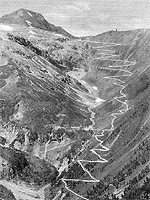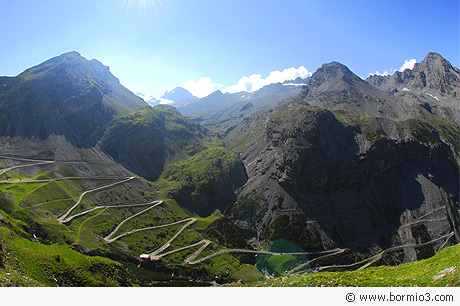Monday 18 June
Today
we drive over the Stelvio Pass into Austria.
We are looking forward to the drive and catching up with Laura and her
family.
Top Gear website with the episode which made the Stelvio Pass more famous than it already was, click on the 4th video titled TESTS.
Due to Top Gear, the road is very busy with many uploading there drive on You Tube, simply type in Stelvio Pass and select a You Tube video to watch.
Map of the route taken from Hotel Riveria (A) to the Hotel Gasthof Ölberg Familie Ilmer (C), Innsbruck.
 |
| The route is approx. 330kms; minimum 5 hours drive, we took 7 hours. |
The
road started to climb and the elevation was increasing quickly, the road was
good and there was not too much traffic.
There
is no sign that says you are climbing to Stelvio, the only indicator is the
elevation is increasing and the hair pin bends start.
Reading
up on the Stelvio Pass (Jerry Garretts article on Stelvio) indicated a lot of motor bike and cyclists use the road,
they were right. The motor bike riders
aren’t too bad on the road, they get past fairly easily however the cyclists own
the road and use it all, meaning you have to avoid them, and there was a lot of
riders on the road going in both directions.
 |
| Looking down into the valley, the SS38 is on the left |
 |
| Looking up the mountain from the cafe |
Our first stop was at a little road side restaurant on the Italian side of the Pass about 10 kms from the top. It was small but busy. The temperature had dropped to around 210C and a cool strong breeze. It was interesting just watching the cyclists, motor bikes and cars passing.
 |
| Watching the traffic |
 |
| Cafe about 10 kms from the top of the Pass |
 |
| View from the road above the cafe |
 |
| View from the road above the cafe |
On the plateau are some buildings and a description of the National Park and the importance this area played in the defence of Italy. Info about the Park and its history.
 |
| Maria collecting fresh drinking water |
 |
| Buildings on the plateau, includes farm houses |
Finally reached the top of the Pass and drove into the village of Stelvio. Even though the temperature was a balmy 220C there was still a lot of snow around. There were plenty of souvenir sellers. Motor bikes and cyclists were the main traffic.
 |
| We reached the top of the Stelvio Pass |

 |
| Checking out the snow |
 |
| View from the top of the Pass |
The drive down the Pass was as good and interesting as the drive up, plenty of hair pin bends and not too much traffic. The road took us to Prato allo Stelvio and the GPS turned us left and onto the village of Glorenza, we pick up the SS40 at Malles Venosta. This road took us to the Austrian/Italian Border which we crossed with out a problem.
 |
| One of the many hair pin bends, at least we could get off the road here |
On the Austrian 180 we drove through Nauders and then past the fortress Festung Nauders. It is located in a narrow gorge offering an ideal military defensive position which the fortress was built to do. Unfortunately we did not stop as we did not realise what the purpose and history of the fortress was at the time.
 |
| Interesting bridge on the Reschen Straße 180, it is narrow for this main thorough fare |
Innsbruck is a lovely city, fortunately the GPS was able to take us to the hotel. The speed limit in a lot of the streets is 30 km/hr and I think I went past the same speed camera 3 times at 50 Km/hr, before I realised that it was a speed camera I went past it 3 times, so I wonder if I’ll get a speeding fine
Found our hotel, the Gasthof Ölberg Familie Ilmer, the lady at the desk (appeared to be the owner) did not speak English and did not have our reservation. When I went to get the laptop with the email confirming our room reservation, a room suddenly appeared to be available. It slowly got worse from here, no lift and we were on the second floor, the stairs were OK but Maria struggled, and I had to carry all of the luggage up. And we were accumulating more luggage than what we left Australia with.
The lobby area and stairs had a slight smell of cigarette smoke. Got to the room which was comfortable and basic, the ensuite was small and the toilet whilst clean had a slight odour. We were about to turn around and find somewhere else when we checked the view, it was worth the very average room and hotel.
As
it was late we decided to stay in for dinner which turned out to be quite
good. The hotel is run by an Austrian
family, whilst welcoming, any requests for help was usually answered with a
‘No’.
We needed to catch up with our laundry needs. We were given a brochure for a laundromat in Innsbruck and no other help, not even assistance with directions to the location. The GPS got us there, but we were to find out later in the week there was one very close to the hotel, it would have helped to know this earlier!
So our 4 day stay began.
We needed to catch up with our laundry needs. We were given a brochure for a laundromat in Innsbruck and no other help, not even assistance with directions to the location. The GPS got us there, but we were to find out later in the week there was one very close to the hotel, it would have helped to know this earlier!
So our 4 day stay began.
Following information from is from the website of Bormio a small village you drive through to get to the Stelvio Pass.
The Stelvio Pass in Italy
Situated at an altitude of 2.758 m., the Stelvio is Europe's highest
road pass, connecting the Valtellina with the Val Venosta. It lies
22 km from Bormio and is closed
in winter season.

The
Stelvio has been the scene of some major military and sporting events
that have gone down in Italian history. Here the world's highest battle
was fought during World War I. The dramatic images of the encounters
between 1915 and 1918.ì, memorabilia form the so-called White War,
and even a reconstruction of a trench can be seen at the Carlo Donegani
Hisotry Museum, created by Banca Popolare di Sondrio and housed in
the rooms adjoining the bank's local branch.
The museum also extensive technical documentation of the various
stages in the construction of the Imperial Stelvio Road, the "Queen
of the Alpine Roads": around twenty perfectly-planned kilometers
engineered by Carlo Donegani in just five years between 1820 and 1825.
Even today, the road still ranks as a masterpiece of civil engineering.
Its creation was decided upon by Franz Josef I of Austria, for military
purposes.

Local sporting events owe much to the existence of this road. Racing
drivers and, more significantly, cyclists have achieved some extraordinary
feats here. The cycling heroes of the 1950s battled in out on the
bends of the Stelvio Road, and it was here that Fausto Coppi earned
his title as "Campionissimo". The Stelvio Pass was dubbed
the "Coppi Peak" in several Giro d'Italia cycle races thereafter.




































